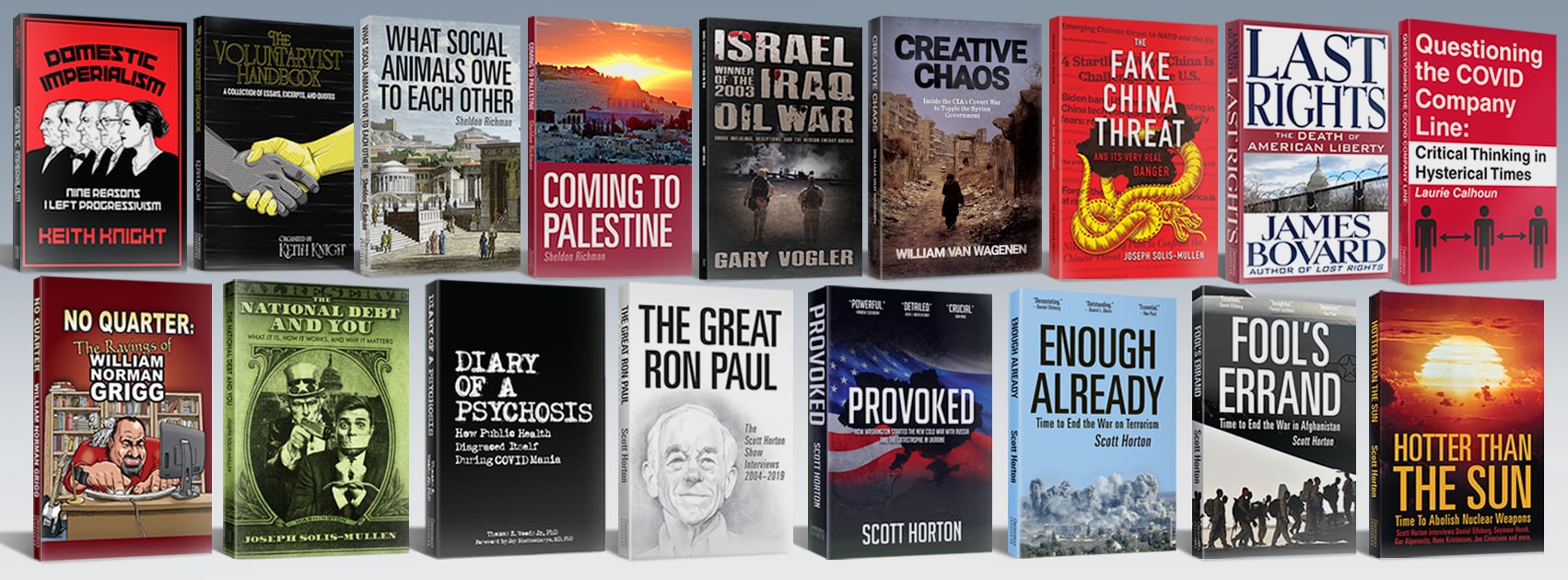Russia Jailing People For Fake News: According to Yahoo.
So what do “we do about this?” America’s Wilsonian evangelism of spreading liberal democracy through military power has always been bunk. So let’s not even start. Even so, I have recently been on about Hitler, WWII, and how I see that conflict as eerily similar to the Iraq Wars etc. (the main difference being the relative balance of power between the US and its strawman punk).
Hitler was a megalomaniac who was also wrong enough about enough things to get millions killed. No doubt. However, he was not some spawn of Satan, though, evil for evil’s sake. Hitler’s views were very consistent with the basic principles of Old European society (nationalism, warrior culture, the tranquility of the province). His other views were very consistent with the modernism coming out of American Progressivism. If Hitler was more authoritarian than American politicians such as either Roosevelt, it was only by virtue of being a more sincere leader (a shocking notion, but only for those who don’t know the Roosevelts truly).
Nevertheless, American culture was resistant to the sort of ideas German society fell for. It’s important to discuss why, and this ties to the idea of “what to do about Russia”.
America had its small share of Nazi sympathizers. If we look at Naziism as the caricature arising from war propaganda, well, then forget about even bothering to look into this and get any substance. However, with nuance, we see that Naziism was different than American good ‘ol boy racism. On the balance, I’d estimate that American racism was more particular, and more severe than Nazi racism. American racists hated black people, an eternally disempowered and underserved minority. Americans racists were scared of black people. Some Southerners would laugh when the Klan killed black people.
I have no doubts that sort of stuff happened in Nazi Germany. Still, Naziism was more political and programmatic about race. Extradition of Jews meant the removal of a somewhat substantial political faction from German society. Moreover, Naziism preferred bureaucratic tidiness in effectuating its race bigotry. American racism was so historically toxic for precisely the reason I’m going to advance as the great flaw of American culture – social insecurity, in this case, of whites.
The contrast is important to grasp, because there’s a tendency to think of Nazis as the caricatured racist crazy person, when there’s actual substance to Nazi ideology that matters to an analysis of it. And it’s not the part of Nazi ideology that exists way at the fringes and wasn’t as relevant to its appeal to German society (the weird esoteric stuff).
There is a bit of the old world in American European immigrant culture. A desire to protect and preserve the farmers’ life, for example, was a big part of early 20th century politics.
Consider the Sherman Anti-Trust Act. At passage, economists mostly spoke out against it, and there was no doubt that it arose from politics, not economic theory. Smaller businesses couldn’t compete against more efficient, innovative businesses. They didn’t want the sweeping change which, although good for society, meant a severe disruption of their stability.
Here you have a good microcosm of what’s wrong with American culture. Again, neurotic insecurity.
America, in contrast to Europe, is defined by a culture of despondent inadequacy. Sure, America is the most innovative country in history, particularly in business practice. But it was always some minority of the total population accomplishing this innovation. The majority has always pushed back in fear of falling behind.
Europe has a tradition of class structures and defined roles. The preservation of stability across the spectrum of class is in the theoretical class interest of all classes. Hitler’s national socialism is a modernist manifestation of this. The idea was to use modern technology and organizational methods, in combination with “class-neutral” political leadership to maintain harmony of the classes.
I swear to God, any time an establishment thinker advances the role of government to ease social ills, or manage industry, what are they saying? Why does the government have to make sure that businesses “behave”. Because the government is force. It’s the same ideology as Hitler’s. No one ever acknowledges this. Which is why Hitler has to be an evil demon, and not merely a guy with bad ideas. American statists advance more or less the same point of view as Hitler. But the ideas have less cache here.
America’s culture rejects social class. There are many reasons – our frontier culture, the revolutionary paradigm, the outsized role of entrepreneurship in our history, our immense wealth. Yes, our “classless” culture is competitive. In my opinion, however, it’s usually fair. Status is obtained through money. And good for America, to be free of the stifling old world class obsession of caring how you were born, what you were born into.
Unfortunately, the competitive nature of American society, with no traditional class boundaries, bred a deep insecurity in the majority – in my opinion. Part of the reason might be because European Americans are used to class, and have a tendency to go looking for it, get confused when it’s absent, and feel disempowered without a group to belong to and to protect them. I think Eastern cultures are much more vulnerable to this.
What happens with American culture is that there’s this superficiality, a social competitiveness, a constant self-inflation of personal worth, a braggadocio which comes off to almost all other world cultures as sophomoric and arrogant. Americans, I think, are desperately afraid of being found out as inadequate, and since a good 60-70% of the public is uncompetitive (given Pareto ratios), this means a regression to the mean, a lowest common denominator culture that paints itself as the opposite.
So, inasmuch as there have been critics of American pop culture, they’ve usually critiqued crass consumerism. I love consumerism, like Rothbard did. I love good, but not great tasting food available to all. I love entertaining, but not sophisticated, art available to all. But American demand for that reassurance of adequacy, it’s not something I like.
This is an American thing: “cool”. It actually means two distinct things. The mild mannered cowboy who is always moral and deliberate, who is confident and powerful, and thoroughly independent. This is the archetype of American adequacy. It blends with the other definition of “cool” which is the ability to parrot social prestige through superficial expression of competency in fashion. This is the “movie star”. America likes to interchange these two concepts, because really the value of the latter depends on its ability to masquerade as the former. The cowboy’s life is lonely, and painful.
The consequences of American culture vis-a-vis Hitler are two fold. First, national socialism wouldn’t have real appeal in America. Class harmony isn’t a value in American society, because it doesn’t make much sense to America. Second, what American culture desires represents part of its weakness. Thus, even though Hitler is fundamentally wrong about what’s best for human society, his critique of America is biting, and accurate.
Of course, a competitive, socially dynamic society is a good thing. It’s why the infant mortality rate is able to drop over time. It’s why cultures can assimilate, and why America isn’t as much like the Balkans. One price of such a society, however, is a popular culture of social insecurity with an overemphasis on social proof. This desperation degrades other important cultural institutions like morality, social norms, and so forth.
In my opinion, California – with its strong Asian influence – overemphasizes social proof even relative to the East Coast. It’s not that Asian culture causes this, but rather that there is a greater diversity of cultural background, including many cultures which care deeply about social rank. Since America has no paradigm for this, the result is insecurity and personal social competition – the race to the bottom to prove fashionability and fit-in the strongest.
I’ve used the example before, but going to college should be a grave undertaking, a sober journey into knowledge. Yet, overwhelmingly it’s a disaster of regretted sex, and mind-melting (or, more gently, time-wasting) drug use. I think the reason is that the kids there are more interested in social competition, something that starts in high school, and something which never ends even as “keeping up with the Joneses” parents do little in the way of demanding reform. Modern parents even encourage the sex, drugs, and rock’n’roll on the basis of knowing that’s what other kids are doing, and a desire for their own kid to keep up, to validate the parents’ own social worth.
Still, it’s fine if people party and drink in their 20s. What matters is the millions and millions of dollars spent, and intellectual capital wasted on this thing we call college. No one wants to admit that college isn’t for them or their kids, and resign to a life of a lower standard of living. Capitalism can meet all our needs, but maybe not if everyone demands a 10 sq ft marble countertop kitchen island.
Considering America’s culture of wealth, in some instances, there is a de-emphasis on social proof. It’s why the upper crusties don’t like Trump. Competence, real or believed, doesn’t have to hide behind Potemkin self-importance. Trump represents the willful embrace, the unapologetic embrace, of false self-importance as a value in and of itself.
My theory about Trump is that he knows this. American “meritocrats” take showy wealth as a sign of incompetence, a compensation for a person’s own awareness of their inadequacy. Trump then, with his flashy wealth, is obviously trolling this class. He’s controlling, 100%, their image of him. The perceptions might be negative, but he’s in control of them. I digress.
So, there’s no effort at balance in American culture. The people who work to make the economy efficient and productive aren’t the majority, and aren’t the main influences on American culture. Moreover, within the “establishment class” there are subclasses, and expressions of insecurity. Enforced humility is almost a kind of social proof mechanism. Virtue signaling is an expression of insecurity among those who are desperate to prove they belong in a class that is supposed to feel socially secure.
What’s my point?
Even America – where the competitive class is actually given free reign to produce – pays for this social order with a fair amount of social problems. And our social problems aren’t a product of us not being socialist enough. They’re a problem of individuals – who have been given freedom – not living their lives in proportion to their means.
NIMBYism, consumer culture, subsidizing wasteful institutions, refusal to acknowledge reality, refusal to be curious about the world (as opposed to: what do I have to know to get ahead in my social context).
You can’t acknowledge what works about America without noting the giant room-elephant that is our cultural rot. That is, to adopt American ways of doing things means also adopting our social problems. My point is that most countries aren’t equipped to deal with those problems – because we barely keep up with them as it is, in America.
Which is just my way of saying that Wilsonianism is garbage.
Why should Putin and Russia, especially with their history (did you know that many of their state governments still retain heavy welfare features from the Soviet Union), be a liberal democracy like America? Becoming a “liberal democracy” (which is not what America really is) means replicating America’s rather awkward social and cultural situation. That’s just not going to happen for most societies, where class notions reign, indeed, where they remain somewhat necessary to preserve the social peace.
What’s crazy is the idea that American laws on the law books, or something, is what makes our society free. As if giving another society “freedom” is a matter of copy and paste.
The best way to deal with Putin, then, is to reproduce America’s cultural tension on the world stage.
Let America be the competitive one, and let the world be the “inadequates”. This will, like in American domestic society, create a somewhat desperate global political order. You’ll see stupid trade barriers, bragging rhetoric. Nations marching their troops around with sharp uniforms to feel better about themselves. You know, like that loser Hitler – national self-inflation of importance. Saddam was all about this.
Meanwhile, America should just produce. The world will get slowly better, albeit imperfectly.
The problem is that American policy is seeking a world order which works internationally how Russia works domestically. American kinetic and covert assets are seeking to jail “fake news” propagators – essentially – by applying literally sanctions on Russia for making fake news.
How about an American approach? How about just not using state violence against idiots we don’t like. Just let them march around in their inadequacy, goofy Putin taking shirtless pictures while skydiving or whatever, while we produce?
I’m not saying American culture is bad in contrast to others. I’m pointing out that our culture is a very problematic, delicate balance. It’s not readily exportable, and indeed, expecting countries to just become like America is not seeing reality.
This, by the way, is the answer for American culture: seeing reality. I don’t envision a “solution” to America’s culture. It is what it is. For one, I think human beings have biological instincts which compel us to have a sense of social status, and also to seek to improve our own social status. Women, in particular, seem to have a fair amount of their sexual attraction tied to perceptions of social status and prestige. In societies with defined class boundaries, there’s a context for these instincts. It goes without saying that a society without such boundaries will feature a lot of flailing around.
The joke is that men have videogames to obtain a virtual sense of conquest and accomplishment, to satisfy a toxic and primitive biological social impulse. I’m not sure that capitalism can produce enduring substitutes for basic human relationships, however, so social tension will always be with us.
Still, if individuals could somehow engage in a mass rejection of social status seeking, then people could adjust to a lifestyle matching the relative value they provide to the economy. This is by no means a recipe for mass starvation – again, some people will drive Mercedes, but most people will be driving Dodge Neon. Of course, in such an ideal culture, no one actually would drive Mercedes – because “curb appeal” would be a moot point. Leather, technological features – these can add comfort and convenience – but they only tie to social status inasmuch as they are a token of unequal outcomes.
The biggest flaw of socialism is the idea that socialists would ever ever accept a world of social equality. Can the cool socialist kid from college really turn his back on his “cool” status with the girls? No way! People who obsess over rank and class (socialists), would be utterly unable to create a world where people don’t care about rank and class. You can redistribute wealth, but you can’t force people to stop trying to prove why they’re better or cooler than other people. Unfortunately.
True socialism would come from a group of people who let go of concern over rank and class. Where you don’t care if unequal ability leads to unequal outcomes, because you’re not trying to compete to be better than other people. That’s the irony. There’s a movie called Enemy At The Gates about Soviet snipers in Stalingrad. The political officer who competes with Jude Law for a lady’s love interest admits that true equality is impossible, because at a minimum, there can be no true equality in love. Bingo.
Interestingly, the superficial trappings of “national socialism” seem to conform to the ideal premise I advanced. The idea isn’t to abolish rank or class, with national socialism, but rather (through the absolute power and violence of a domineering party state) to abolish the meaningfulness of rank and class. We see that Hitler’s regime led to massive violence, required it, required lies, and had massive economic and political problems, and invited massive warfare to sustain an enduring social paradigm. It obviously can’t work. However, the national socialistic mindset provides an interesting foil to American culture that conventional socialism, with its unrealistic desire to abolish social status itself, cannot.
Our conclusion shouldn’t be sympathy for Hitler’s ideas. We shouldn’t conclude that America needs to be “fixed”.
Instead, we need to develop a more realistic appraisal of American culture, and its challenges. For one, it’s enough to teach us the folly of Wilsonianism. American culture is not all benefits, and even America may not survive these social problems. Ironically, if we don’t survive, it will be because the people turn to socialism or national socialism for a sense of security.
This is why understanding this matters. This is our vulnerability, as a society, the insecurity. We can attribute most of our bad political outcomes to it – protectionism, welfare, warfare, NIMBYism, and so forth. Our social problems relate to it, too.
No, Billy, you can’t necessarily grow up to be an astronaut. But your life can still be fulfilling. Nobody says that, in America’s traditional culture.
As for Russia, they’re doing pretty well compared to the past. Shouldn’t that count for something? Our goals should be to manage our actions to prevent things from getting worse, and encourage them to get better.
Let’s not antagonize Russia, so that their domestic political ills don’t lead to costly conflict that affects us.
Let’s not antagonize Russia, so that we don’t galvanize the people into lending more support than they otherwise would to authoritarian rule.
Is it so hard?
Yeah, because America has to “be better” than all the other countries. Culturally, a politician here cannot admit that something is America’s fault. Social proof.
Well, crap.















